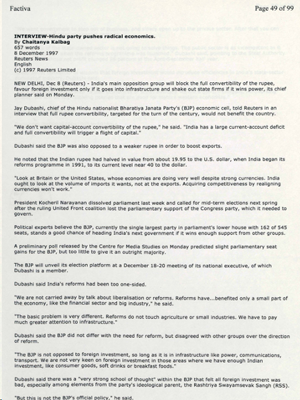INTERVIEW-Hindu party pushes radical economics
[Reuters]
Published date: 8th Dec 1997
8 December 1997
Reuters News
English
(c) 1997 Reuters Limited
NEW DELHI, Dec 8 (Reuters) – India’s main opposition group will block the full convertibility of the rupee, favour foreign investment only if it goes into infrastructure and shake out state firms if it wins power, its chief planner said on Monday.
Jay Dubashi, chief of the Hindu nationalist Bharatiya Janata Party’s (BJP) economic cell, told Reuters in an interview that full rupee convertibility, targeted for the turn of the century, would not benefit the country.
“We don’t want capital-account convertibility of the rupee,” he said. “India has a large current-account deficit and full convertibility will trigger a flight of capital.”
Dubashi said the BJP was also opposed to a weaker rupee in order to boost exports.
He noted that the Indian rupee had halved in value from about 19.95 to the U.S. dollar, when India began its reforms programme in 1991, to its current level near 40 to the dollar.
“Look at Britain or the United States, whose economies are doing very well despite strong currencies. India ought to look at the volume of imports it wants, not at the exports. Acquiring competitiveness by realigning currencies won’t work.”
President Kocheril Narayanan dissolved parliament last week and called for mid-term elections next spring after the ruling United Front coalition lost the parliamentary support of the Congress party, which it needed to govern.
Political experts believe the BJP, currently the single largest party in parliament’s lower house with 162 of 545 seats, stands a good chance of heading India’s next government if it wins enough support from other groups.
A preliminary poll released by the Centre for Media Studies on Monday predicted slight parliamentary seat gains for the BJP, but too little to give it an outright majority.
The BJP will unveil its election platform at a December 18-20 meeting of its national executive, of which Dubashi is a member.
Dubashi said India’s reforms had been too one-sided.
“We are not carried away by talk about liberalisation or reforms. Reforms have … benefited only a small part of the economy, like the financial sector and big industry,” he said.
“The basic problem is very different. Reforms do not touch agriculture or small industries. We have to pay much greater attention to infrastructure.”
Dubashi said the BJP did not differ with the need for reform, but disagreed with other groups over the direction of reform.
“The BJP is not opposed to foreign investment, so long as it is in infrastructure like power, communications, transport. We are not very keen on foreign investment in those areas where we have enough Indian investment, like consumer goods, soft drinks or breakfast foods.”
Dubashi said there was a “very strong school of thought” within the BJP that felt all foreign investment was bad, especially among elements from the party’s ideological parent, the Rashtriya Swayamsevak Sangh (RSS).
“But this is not the BJP’s official policy,” he said.
He was scathing about India’s slow privatisation programme, which aims to hive off small chunks of state owned giants.
“We want government to step out of business, and slowly open up to the private sector. After that you can think of letting foreign companies come in .
“Selling bits of the state-owned sector is not going to solve things. The public sector is as incompetent as it was six years ago when the reforms programme was aunched,” Dubashi said, pointing to the Steel Authority of India Ltd, whose net profit plunged 86 percent in the April-September half year.
Asked about conventional wisdom that foreign investment would introduce efficiencies in India’s state-sector dominated industry, Dubashi said:
“India is a huge market with its own economies of scale. Basically we are a good, intelligent, hardworking people. We are blindly following policies that are good for mature western economies.”
(c) Reuters Limited 1997






